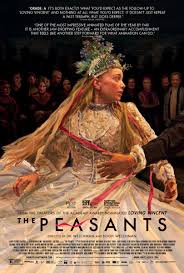
THE PEASANTS/ CHLOPI
Poland, 2023, 115 minutes, Colour.
Kamila Urzedowska, Robert Gulaczyk, Miroslav Baka
Directed by DK Welchman, Hugh Welchman
The Peasants is based on a novel of this name by Nobel prize winner, Władysław Reymont, it is set in a village in Poland set at the turn of the 19th and 20th centuries.
The characters and plot of the film are reminiscent of many of this kind of village story, a focus on a young woman, having an affair with the married son of the richest landowner who then decides to marry her, taking land from his son and daughter in law and bestowing it on his new wife. There are various family disputes and insults, the death of the old man as he goes out in the delusion to sow his fields, disputes with landowners about the cutting down of the forest, the intrusion of Russian troops.
The structure of the film consists of the four seasons, the sowing and harvest of the fields, with summer having a severe drought. There is a further complications between the relationships, the young woman more promiscuous, her lover turning violent against her, and the townspeople then turning against the young woman, humiliating her, banishing her from the town.
However, the most striking aspect of the film is its technique, the husband and wife team having use this technique for their documentary about Vincent Van Gough, Loving Vincent.
A Wikipedia description of the process: The film was produced using the painted animation technique over the production of five years, similar to the Welchman duo's previous film, Loving Vincent. Initially the film was shot with the actors, and then more than a hundred painters in four studios in Poland, Lithuania, Ukraine, and Serbia painted oil paintings based on the shots, which became frames in the film. Animators then worked to supplement the paintings to make the whole film seamless. The artists spent over 200,000 hours in total working on the project. The film features works from the turn of the 19th and 20th centuries, with an emphasis on Young Poland artists.
Which means that the dramatic and melodramatic aspects of character and plot are familiar enough but the film is often extraordinary to look at.
- The Nobel Prize winning novel? What adaptation? The seasons? Life in the Polish village?
- The impact of the technique, the live action, the oil paintings based on the shots? The overall effect?
- The recreation of the village, costumes, homes, fields, the streets, church? Atmosphere?
- The background Catholicism? Yet the behaviour of the citizens? The priest, the rituals, talk of confession, Easter celebration?
- The focus on the four seasons, the light, the visuals, the fields and harvest? The musical score?
- Jagna at the centre of the film, with her mother, her age, her cutouts and their skill, the relationship with Antek, his being married, his wife’s reaction, his father’s reaction? The furtive nature of the affair? Yet people knowing? The proposal by Boryna, widower, wealthy, relationship with his son and daughter-in-law, ousting them, giving the land to Jagna, the wedding, family resentments, the couple carrying on the affair?
- The death of the old man, the fields, his funeral, the issue of the forests, the landowners, the Village people reacting, the intrusion of the Russian troops? Antek and his arrest?
- The daughter-in-law, her strong mindedness, insulting Jagna, the return of her husband, his continuing the affair?
- Work in the village, the farms, the carpenter and his attraction to Jagna, offer of marriage? Her reactions? The return of Antek, his violence, the rape?
- The harsh summer, the reaction of the village, the young priest and her flirtation, his mother’s reaction, the people gathering together, the protest, the torment and torture of Jake and, ousting her, and tech not intervening for her, covered in mud, washing, and going out to her future?